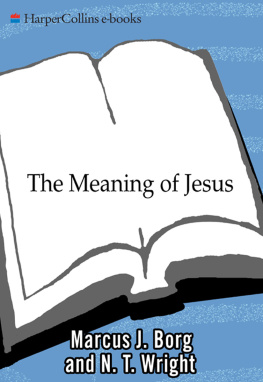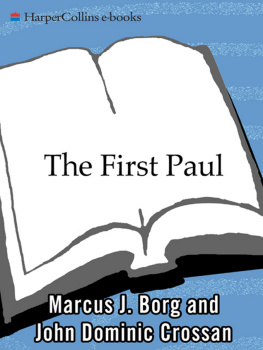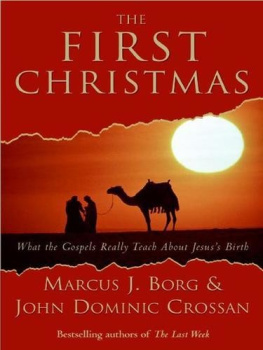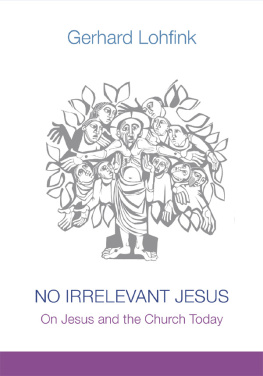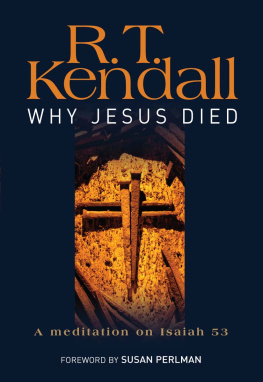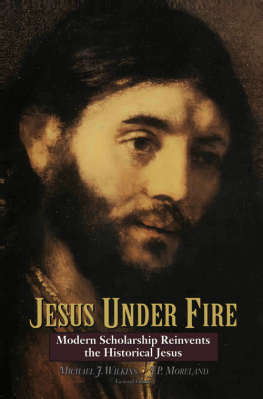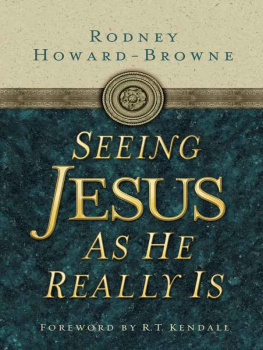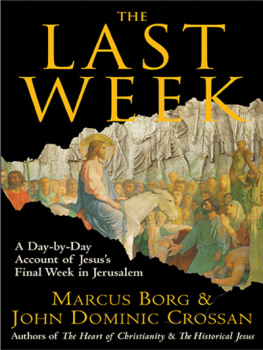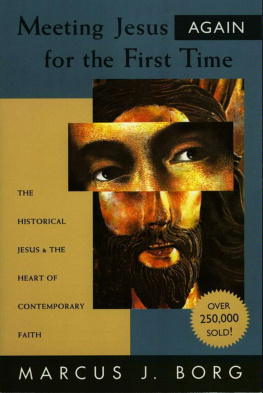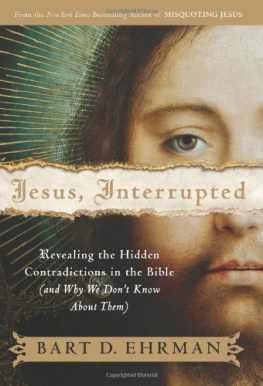Borg Marcus J. - The Meaning of Jesus
Here you can read online Borg Marcus J. - The Meaning of Jesus full text of the book (entire story) in english for free. Download pdf and epub, get meaning, cover and reviews about this ebook. year: 2014;2009, publisher: HarperCollins e-Books, genre: Religion. Description of the work, (preface) as well as reviews are available. Best literature library LitArk.com created for fans of good reading and offers a wide selection of genres:
Romance novel
Science fiction
Adventure
Detective
Science
History
Home and family
Prose
Art
Politics
Computer
Non-fiction
Religion
Business
Children
Humor
Choose a favorite category and find really read worthwhile books. Enjoy immersion in the world of imagination, feel the emotions of the characters or learn something new for yourself, make an fascinating discovery.
- Book:The Meaning of Jesus
- Author:
- Publisher:HarperCollins e-Books
- Genre:
- Year:2014;2009
- Rating:5 / 5
- Favourites:Add to favourites
- Your mark:
- 100
- 1
- 2
- 3
- 4
- 5
The Meaning of Jesus: summary, description and annotation
We offer to read an annotation, description, summary or preface (depends on what the author of the book "The Meaning of Jesus" wrote himself). If you haven't found the necessary information about the book — write in the comments, we will try to find it.
The Meaning of Jesus — read online for free the complete book (whole text) full work
Below is the text of the book, divided by pages. System saving the place of the last page read, allows you to conveniently read the book "The Meaning of Jesus" online for free, without having to search again every time where you left off. Put a bookmark, and you can go to the page where you finished reading at any time.
Font size:
Interval:
Bookmark:
N. T. Wright
Two Visions

THIS BOOK HAS grown out of a friendship. We first met in 1984, after Tom Wright had read Marcus Borgs book Conflict, Holiness, and Politics in the Teachings of Jesus. As Tom has described elsewhere, he found this book exciting and illuminating, and he sought out Marcus to congratulate him as well as to explore some matters arising and to ask why the book had ended as it did rather than in certain other possible ways.
Since our friendship thus grew out of the fascinated study of Jesus within his historical context, it is appropriate that it should give birth, some fourteen years later, to a book in which we put down some markers indicating where the conversation has led. During this period, we both have published several books and articles, many of them about Jesus. It is impossible in a work of the present size to rehearse all the arguments and to set out all the documentation, which are the normal requirements of scholarship. The main lines of most of what we here summarize have been set out and argued for in these other works, though at various points we both go beyond what we have said elsewhere, not least as a result of our own continuing dialogue.
Our personal stories are both interestingly similar and interestingly different. Marcus Borg grew up in a traditional and conventional Midwest Lutheran church, Tom Wright in a traditional and conventional Anglican one in the north of England. Marcus found increasing difficulties with his tradition in his teens and twenties, though he never lost his fascination with its central figure, and through that he has come back into a lively and active Christian faith. Tom, at the equivalent period of his life, found the tradition coming alive in fresh ways through some fairly un-Anglican styles of spirituality, though he never lost his instinctive rootings in the liturgical life of the church, and he has faced the predictable challenges that arise through the study of history and philosophy. Both of us went to Oxford University, and both, though at different times, ended up studying under the late Professor George B. Caird; our indebtedness to him has been recorded elsewhere. Marcus, however, continued to pursue the study of Jesus, whereas Tom at that stage focused almost entirely on Paul, coming to the historical study of Jesus in the late 1970s.
We are both committed to the vigorous practice of the Christian faith and the rigorous study of its historical origins and to the belief, which we find constantly reinforced, that these two activities are not, as is often supposed, ultimately hostile to each other. Rather, we find them mutually informative and supportive. To put this another way: we both acknowledge Jesus of Nazareth as Lord, and we regard the no-holds-barred study of his actual history as a vital part of what we mean by that. For precisely this reason, we deliberately began the work for this specific project in shared eucharistic worship, when Marcus visited Tom in Lichfield (England) in September 1997. The plan for the book took shape within the framework of participating together in morning and evening prayer in Lichfield Cathedral during the following five days. We believe that this setting, so far from prejudicing the objectivity of our work, was and is the most appropriate context for it. There is, after all, no such thing as objectivity in scholarship. Anyone who supposes that by setting scholarship within a modern secular university, or some other carefully sanitized, nonreligious setting, they thereby guard such work against the influence of presuppositions that can seriously skew the results should, we suggest, think again.
This is not to say, of course, that we find ourselves in substantial agreement on the majority of issues. If that were so, there would hardly be a book to write. Indeed, within the bounds of friendship and shared Christian faith and practice, we have both frequently been puzzled, and even disturbed, by some of what the other has said. Working on this book has at least enabled us to understand each other a lot better, to explain to each other (and perhaps to our readers) things that we each had thought were clear but that apparently werent, and to remove impressions that had been unwittingly given. Inevitably, this has left the remaining disagreements posed more sharply. We have not flagged them all the way through the book, since to do so would become complex and tedious. The reader will quickly see where they are to be found. What results is, as it were, a single-frame photograph taken from a long sequence, freezing one moment in our conversation in the hope that others will find it interesting and helpful.
We envisage at least three categories of interested readers.
First, we hope that those who would not call themselves Christians will find the conversation interesting and refreshing. We both believe strongly that what we say about Jesus and the Christian life belongs, not in a private world, inaccessible and incomprehensible except from faith to faith, but in the public world of historical and cross-cultural study, in the contemporary world as well as the church.
Second, we hope to shift logjammed debates into more fruitful possibilities. Much current writing about Jesus falls into rather sterile either-or distinctions (such as the classic fundamentalist versus modernist debates); we venture to suggest other ways in which the issues might be lined up. We hope thereby to advance an ecumenical dialogue that is often ignored. Liberal Lutherans, for instance (to use a broad-brush term for the moment), have more in common with liberal Anglicans or Presbyterians than with the more conservative members of their own denominations. Our dialogue might provide stimulus for such groups to begin to talk to each other afresh. While hard-line fundamentalists and radicals will both perhaps gnash their teeth, we hope that this book will serve as a bridge between many other groups of Christians.
On this point, it might appear at one level that Tom is a traditionalist in his views and Marcus a revisionist. There is a grain of truth in this, but we regard these labels, and similar ones, as quite misleading. Tom has come, through wrestling with the history and culture of first-century Judaism, to a picture of Jesus that is seriously at odds with traditional Christian views on some matters (for example, Jesus supposed predictions of his second coming), while supporting the tradition in other matters, though from quite new angles. Marcus has come, through wrestling with cross-cultural issues of how to describe appropriately a figure like Jesus, to a picture that is firmly supportive of the tradition on some matters (for example, Jesus healings, his spirituality, and his founding of a movement), while questioning it on many others, though by no means always in what has become the standard, dare one say traditional, revisionist fashion. Tom feels able, as a historian, to attribute more of the gospel material to Jesus than Marcus does, though the meaning Tom suggests for the material is by no means always what the traditionalist would expect. Marcus, in suggesting that less of it goes back to Jesus himself, nevertheless insists upon its importance, its truthfulness in senses other than historical, and its validity within a contemporary Christian vocation to follow Jesus.
Third, we hope to open up more specifically the perennially important question of how different visions of Jesus relate to different visions of the Christian life. Many who are deeply concerned with issues of justice, spirituality, pastoral care, and other matters within the churches do not always relate these issues to the question of Jesus. We propose some ways in which this might be done.
Font size:
Interval:
Bookmark:
Similar books «The Meaning of Jesus»
Look at similar books to The Meaning of Jesus. We have selected literature similar in name and meaning in the hope of providing readers with more options to find new, interesting, not yet read works.
Discussion, reviews of the book The Meaning of Jesus and just readers' own opinions. Leave your comments, write what you think about the work, its meaning or the main characters. Specify what exactly you liked and what you didn't like, and why you think so.

